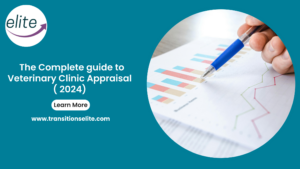How to Sell Veterinary Real Estate (In 2024)

Selling Veterinary Real Estate In 2024
Selling your veterinary practice is a monumental occasion. As a result, you’ll want to make sure that you take the proper steps to prepare for this special transaction, including learning how to sell the veterinary real estate you may own. After all, your practice and real estate are significant investments that you’ve dedicated resources, time, and effort to.
Selling your veterinary real estate is a time for growth and change, especially as the veterinary services industry continues to grow in 2024. Whether you’re looking to retire and conduct an asset sale by selling your real estate separately, or you’re looking to upgrade to a new location, understanding the basics of this important transaction is essential.
Read – The Complete Guide to Selling a Veterinary Practice (2024)
Understanding Veterinary Real Estate
There are various parts of your veterinary practice that can be considered veterinary real estate. This includes any building or location that is used to house operations directly linked to the function of your practice. It is structured in such a way that it is able to support the unique needs of a veterinary practice. Some examples of the most common forms of veterinary real estate include clinics, hospitals, specialty clinics (such as dental clinics), and boarding facilities.
Not all commercial property is created equal, and veterinary real estate is no exception. There are various key factors that serve to differentiate veterinary real estate from other types of commercial veterinary real estate. This includes the overall specialized structure of veterinary real estate, such as its design and regulatory requirements.
Some of the factors that make veterinary real estate unique compared to other types of commercial real estate include:
Specialized Equipment and Interior Design
Like a healthcare practice, veterinary practices require certain equipment to be fully functional. This includes equipment like X-rays machines, examination tables, and similar features. However, they also require unique interior design, such as examination rooms and a waiting room. This can help veterinary real estate stand out from other commercial real estate that may not have these same requirements.
Regulatory and Compliance Requirements
As a specialized form of commercial real estate, there are several regulatory and compliance requirements that veterinary real estate must meet. This is especially true given that veterinary practices function within the healthcare space. As a result, aspects of the property such as sanitation equipment and zoning may be unique.
Pet-Friendly Layouts and Designs
Veterinary real estate is often specially designed to cater to the needs of pets and their owners. As a result, they will often have features, layouts, and designs that are unique to veterinary practices.
Utility Requirements
As an animal healthcare service provider, a veterinary practice utilizes a large amount of utilities each and every day. This includes HVAC, water, and electricity. As a result, some veterinary real estate may include specialized utility equipment to help optimize performance.
Market Trends and Insights for Veterinary Real Estate in 2024
When navigating the market trends for veterinary real estate in 2024, it is important to note that the sector has experienced an abundance of growth. A rise in pet ownership in recent years, paired with innovations in animal healthcare, has increased the demand for veterinary services. As a result, with more and more veterinary practices forming throughout the country, there is a greater need for veterinary real estate.
Preparing Your Veterinary Real Estate for Sale
If you are interested in moving toward selling your veterinary real estate, the first step is to prepare yourself fully. This is an invaluable transaction and a significant choice in your career, and you’ll want to make sure that you know what to expect during the sale.
Property Assessment
The first part of preparing your veterinary real estate for sale is undergoing a property assessment. This will evaluate the condition of the property in order to get ready for valuation. Collaborating with a property inspector can be the best way to ensure everything about your property is safe, up-to-date, and not in need of any repairs.
Financial Preparation
Even if you are only selling your veterinary real estate and not your entire practice, you’ll need to ensure that all financial documents are prepared and together. This includes financial performance, as this can provide invaluable insight into how the property functions as veterinary real estate.
Regulatory Compliance
Your veterinary practice, and thus real estate, requires certain permits and licenses. Prior to the sale of your veterinary real estate, you’ll want to make sure that not only are all these official documents up-to-date but that you have them available and readily accessible.
Valuation of Veterinary Real Estate
There are several different ways to conduct a valuation of veterinary real estate. This includes an income-based valuation, a market-based valuation, and a cost-based valuation.
In an income-based valuation, the value of your veterinary real estate will be calculated based on rental income and profitability. This value is unique to your practice, and it does not reflect the other real estate that may have sold in the area.
On the other hand, a market-based valuation compares your veterinary real estate with those that have recently sold in the nearby area. It compares similar features, such as location and design, in order to develop an accurate value.
A cost-based valuation may be less common but is still helpful in understanding the value of your veterinary real estate. This form of valuation assesses the cost to replace the property minus depreciation.
Various factors can influence the information gathered during these evaluations. This includes factors intrinsic to the property, such as the size, location, and condition, as well as factors like current and potential income and market trends.
Read more – How to Calculate Valuation of a Vet Practice( In 2024)
Marketing Your Veterinary Real Estate
Selling your veterinary real estate is similar to selling any sort of product or service. That is, the heart of this transaction often comes down to your marketing. This helps not only increase visibility but can also increase demand, thus allowing you to maximize your financials during the sale.
The first step in marketing your veterinary real estate is constructing a concrete marketing plan. During this time, you’ll also want to make sure that you are staging your veterinary real estate in order to produce the most appealing listings. From here, you’ll want to utilize a variety of resources, such as online real estate platforms, to help you sell.
Negotiation and Sale Process
Working with a professional broker during the negotiation and sale process can be invaluable. These are individuals who understand not only the process but the market, and collaborating can help make sure that you are working toward the best future for your veterinary real estate.
During this step, you’ll need to handle offers, practice due diligence, and eventually close the sale.
Legal and Tax Considerations
There are various legal and tax considerations to take into account when learning how to sell veterinary real estate. These considerations can vary based on several factors, including your state and local laws, how long you’ve owned your property, and how you’re selling it.
Consulting with legal and financial advisors can help you navigate this important part of the sale.
Case Studies and Success Stories
One practice owner in rural Canada spent 12 months collaborating with different professionals in the hope of selling their two practice locations, only to find that it was unlikely anyone in the area was looking to purchase veterinary real estate.
However, after they reached out to Transitions Elite, we were able to network and connect this practice owner with a potential buyer, who went on to purchase not one but both locations for $29 million.
Our professional team here at Transitions Elite understands how daunting selling veterinary real estate can be, especially if you don’t know where to begin. However, we also have experience in navigating the market, and we are dedicated to guiding you along every step of the way, helping you feel reassured and confident.
Hear from our clients who have achieved success with help of Transitons Elite
Get to know Dr. Sharon Gorman, Dr. David Graeff and Dr. Lonnie & Naomi Davis who have experienced the incredible benefits of partnering with Transitions Elite when it comes to practice valuation and selling. Discover why understanding the true value of your practice is crucial and why Transitions Elite is the best choice when looking to sell.
“I had previously looked at selling the practice on my own, and I had talked to five different companies about this and had gone through the process individually, and none of it turned out to my satisfaction. After I signed up with Tom, he marketed me to these interested companies. There was competition amongst those interested. It was so relieving at the end of it to know that I got the very best deal possible!”
David Graeff, Cedar Rapids, Iowa
I knew that I would get the best value for my practice if I had a professional helping me. And it definitely turned out to be true that having Tom in my corner.
I have zero doubt that I would not have gotten the value for my practice if I didn’t have him on my side as well as the ease of it. It was such an easy transition and he made the entire process very simple.
Sharon Gorman – Las Vegas, Nevada
Transitions Elite holds your hand and guides you through the whole process. Even though it’s a stressful time and situation, they make selling so easy.
Dr. Lonnie & Naomi Davis – Ohio
Don’t miss out on your chance to discover the true worth of your practice. Click here to request a free valuation.
Conclusion
Taking the steps to understand how to sell veterinary real estate in 2024 begins with learning the various factors involved. This includes how veterinary real estate differs from other types of commercial property as well as the different steps involved in gaining an accurate valuation of your property and the sale process.
Selling your veterinary real estate is a monumental step, one that you’ll want to be well informed about. Working with professionals such as those at Transitions Elite can help make sure that this significant transaction is seamless. Reach out to Transitions Elite today to receive a free practice valuation.










